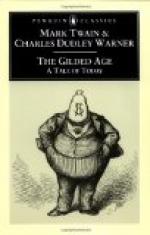“A gentleman, sir. My father used to always say, sir”—
“Capt. Sellers, did you; ever see this man, this supposed father?”
“No, Sir. But upon one occasion, old Senator Thompson said to me, its my opinion, Colonel Sellers”—
“Did you ever see any body who had seen him?”
“No, sir: It was reported around at one time, that”—
“That is all.”
The defense then sent a day in the examination of medical experts in insanity who testified, on the evidence heard, that sufficient causes had occurred to produce an insane mind in the prisoner. Numerous cases were cited to sustain this opinion. There was such a thing as momentary insanity, in which the person, otherwise rational to all appearances, was for the time actually bereft of reason, and not responsible for his acts. The causes of this momentary possession could often be found in the person’s life. [It afterwards came out that the chief expert for the defense, was paid a thousand dollars for looking into the case.]
The prosecution consumed another day in the examination of experts refuting the notion of insanity. These causes might have produced insanity, but there was no evidence that they have produced it in this case, or that the prisoner was not at the time of the commission of the crime in full possession of her ordinary faculties.
The trial had now lasted two weeks. It required four days now for the lawyers to “sum up.” These arguments of the counsel were very important to their friends, and greatly enhanced their reputation at the bar but they have small interest to us. Mr. Braham in his closing speech surpassed himself; his effort is still remembered as the greatest in the criminal annals of New York.
Mr. Braham re-drew for the jury the picture, of Laura’s early life; he dwelt long upon that painful episode of the pretended marriage and the desertion. Col. Selby, he said, belonged, gentlemen; to what is called the “upper classes:” It is the privilege of the “upper classes” to prey upon the sons and daughters of the people. The Hawkins family, though allied to the best blood of the South, were at the time in humble circumstances. He commented upon her parentage. Perhaps her agonized father, in his intervals of sanity, was still searching for his lost daughter. Would he one day hear that she had died a felon’s death? Society had pursued her, fate had pursued her, and in a moment of delirium she had turned and defied fate and society. He dwelt upon the admission of base wrong in Col. Selby’s dying statement. He drew a vivid, picture of the villain at last overtaken by the vengeance of Heaven. Would the jury say that this retributive justice, inflicted by an outraged, and deluded woman, rendered irrational by the most cruel wrongs, was in the nature of a foul, premeditated murder? “Gentlemen; it is enough for me to look upon the life of this most beautiful and accomplished




